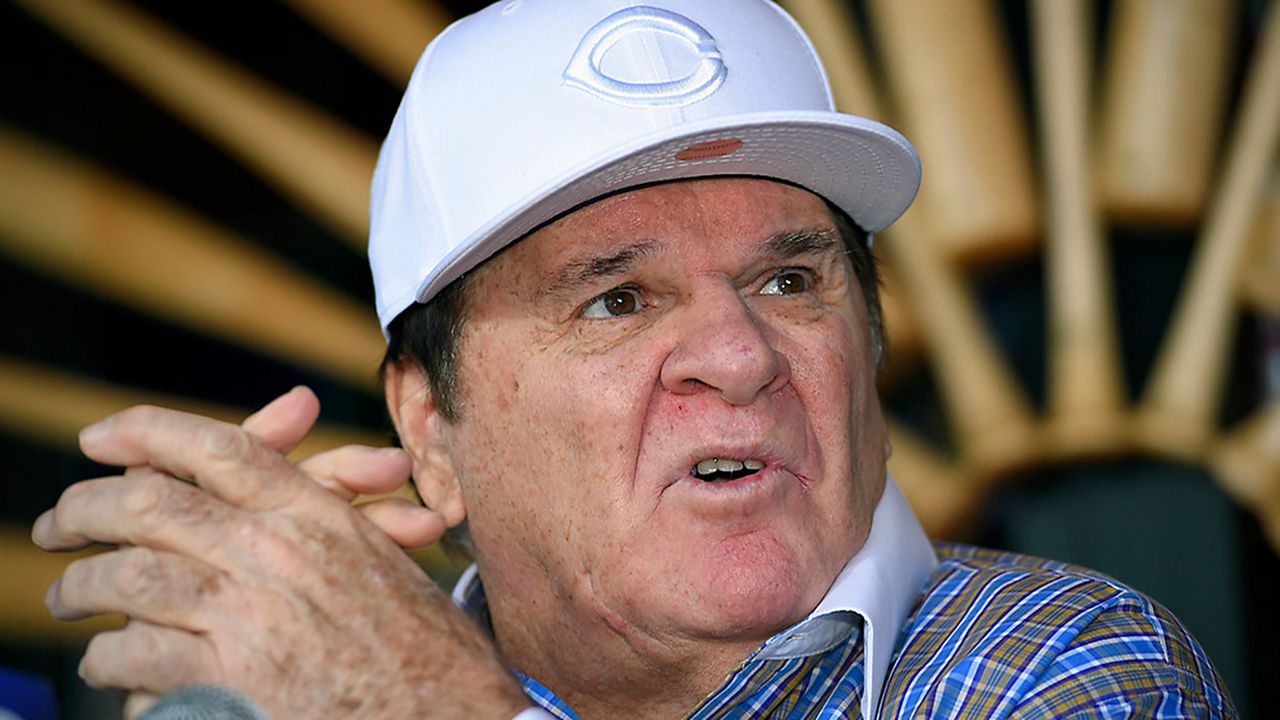LAS VEGAS (AP) — Betting on baseball got Pete Rose banned from the game, never to return while he was alive.
But, perhaps appropriately, he found a home in the nation's gambling capital — where acceptance wasn't a problem.
In choosing to live in Las Vegas, before the sport's career hits leader died Monday at 83, the man known as Charlie Hustle for his relentless play on the basepaths picked a city that embraced legalized sports betting long before most of the rest of the nation caught on.
Rose was a regular at autograph sessions throughout the Las Vegas area, engaging with those who approached him to talk about his glory days with the Cincinnati Reds and Philadelphia Phillies and maybe even to commiserate about why he wasn't eligible for the Hall of Fame.
“He was very patient with his time,” said Jay Kornegay, executive vice president of race and sports operations at Westgate Las Vegas. “He wasn't in and out. After the sessions, he stayed around and spent time with the fans and answered a lot of questions. His whole history speaks for itself, but as far as the Hall of Fame and betting on sports, he was more popular than ever.”
According to the medical examiner, Rose had hypertension and heart disease as well as diabetes, but his “manner of death was natural.”
Rose appeared to be a certain Hall of Famer after a brilliant playing career spent mostly with his hometown Reds. He was a 17-time All-Star, won three World Series rings and set the record with 4,256 hits to surpass Ty Cobb’s long-held mark of 4,191.
But his journey to Cooperstown got derailed when Rose was embroiled in a betting scandal while managing the Reds. A Major League Baseball investigation determined that Rose bet on MLB games between 1985 and 1987, including those involving the Reds, and he agreed to a lifetime ban in August 1989.
Rose denied the allegations for many years before acknowledging in 2004 he gambled on baseball, in hopes the sport would allow him back in its good graces and eventual entry into the Hall of Fame.
One of Las Vegas' most known and prolific sports bettors, Billy Walters, said Rose erred from the beginning.
“He should've never bet on baseball,” said Walters, who grew up in Kentucky and was a big fan of the Reds and Rose. "There are a lot of things you can gamble on. Secondarily, after he got caught, he should've fessed up and told the truth. He should've asked for forgiveness. I think if he had done that, it might've taken a while, but I think he would've been inducted into the Hall of Fame.
“But he made those two mistakes, and he continued to bet on baseball after he was seeking a spot in the Hall of Fame. Look, there's no one in the world who's more pro-gambling than I am, but if you're in some sport, especially baseball ... you're not allowed to do that.”
Baseball tried to distance itself from sports betting, legal or otherwise, after the Black Sox scandal in which eight Chicago White Sox players were banned for throwing the 1919 World Series to, coincidentally, the Cincinnati Reds.
White Sox star Shoeless Joe Jackson, who had a lifetime .356 batting average, was one of the players banished and, like Rose, is not in the Hall of Fame.
The sport has had other various betting controversies since then, including Los Angeles Dodgers manager Leo Durocher and Detroit Tigers pitcher Denny McLain getting suspended for gambling. Willie Mays and Mickey Mantle, despite being long retired, were reprimanded for associating with casinos.
Baseball wasn't alone in its condemnation of even legal forms of gambling. The other major professional sports leagues as well as the NCAA maintained the same stance until the United States Supreme Court in 2018 ruled the Professional and Amateur Sports Protection Act passed by Congress in 1992 was unconstitutional.
Until then, only Nevada offered legal single-game wagering. Now 38 states have legalized sports betting, and companies from BetMGM Sportsbook to Caesars Entertainment to DraftKings advertise prominently during MLB, NFL, NBA and NHL games as well as college football and basketball.
Leagues and college conferences have contractual relationships with gambling companies, which can create an odd dynamic. Officials don't want any hint of impropriety and work with firms that monitor betting to make sure nothing illicit takes place, which has led to several athletes getting disciplined for sports betting.
Some rules have softened to allow players to return to the field or arena more quickly, an indication that each infraction is not viewed in the same manner. An athlete who bets on another sport, for example, is not held in the same light as one who gambles on a game in which they are participating.
Fay Vincent, MLB commissioner from 1989-92, said Tuesday his sport may have to create a separate category in the Hall of Fame for those accused of betting on the game or taking performance-enhancing drugs.
“There's going to have to be a sorting out of corruption and sports, and gambling is right at the crossroads of that,” Vincent said. "I'm predicting there will be a sort of subterranean Hall of Fame for those who are tainted, but recognition that we're going to honor their baseball but not their corruption.
“At the same time, I think there will be a recognition that the overwhelming financial impact of gambling on sports cannot be tolerated without some national supervision and legal dimension because the gamblers are going to try to rig the games as they always do. That explosion is going to require a total re-examination of what we've done to ourselves.”





